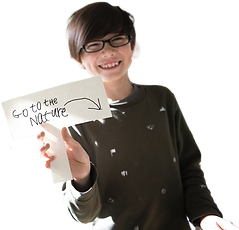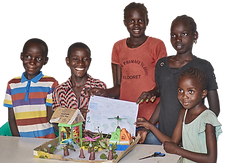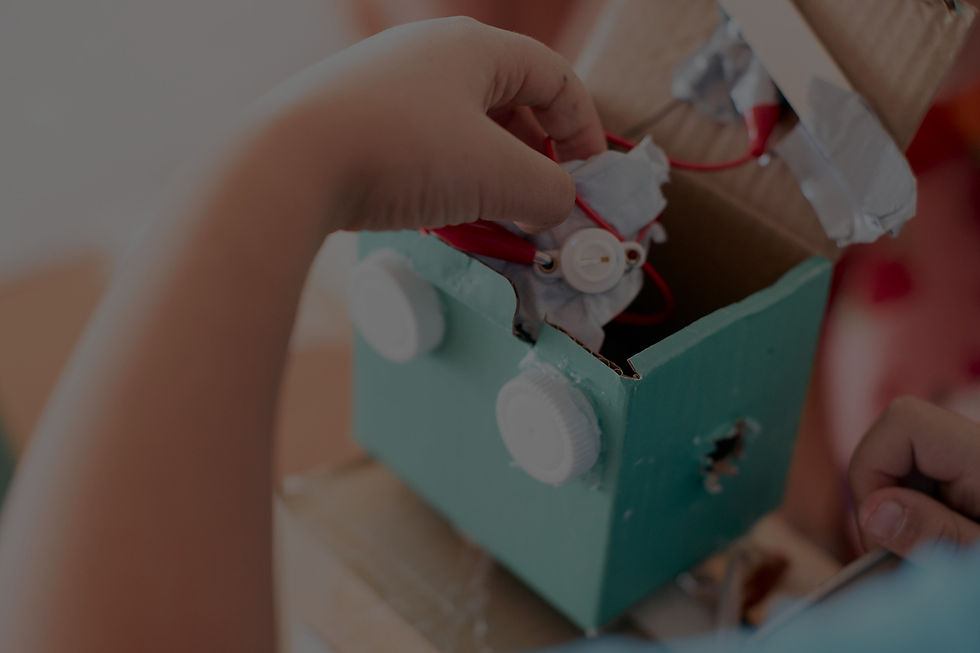
A DECADE OF IMPACT:
Empowering Change through Children’s Creativity

Imagine a world where children are not just dreamers but doers - where their ideas shape the future and their creativity is the answer to our most pressing global challenges. For the past decade, Designathon Works has turned this vision into reality. Through the simple yet transformative belief that children, with their boundless imagination and innate empathy, hold the key to solving the world’s greatest problems, Designathon Works has sparked a global movement.
Across more than 50 countries, in schools and communities, children have stepped up to show that they are not just the leaders of tomorrow - they are changemakers today. From tackling climate change to addressing water scarcity, they have demonstrated the empathy, creativity, and determination needed to build a better world for everyone. This report reflects on the profound impact of Designathon Works over the last ten years, supported by data, real-life stories, and testimonials from network partners, alumni, facilitators, supporters, funders and children. From refugee camps in Africa to bustling cities in Europe, children have come together to create solutions for complex problems - challenges that adults might not expect them to understand, let alone attempt to solve.
This is their story. This is our shared future.

Designathon Works’ reach and impact over the years have been incredible. Watching children bring their ideas to life, I am reminded of the importance of nurturing the next generation of changemakers. -Emer Beamer, Designathon Works Founder
Over the past decade, so much progress has been made, but I think that the heart and soul of Designathon Works has never changed - that's also beautiful to see. -Maarten Nielsen, Designathon Works Treasurer

GREEN SKILLS: Nurturing Environmental Awareness and Innovation
From designing solar-powered water filtration systems to building robots that clean the oceans, children have embraced sustainability as a way of life. Through Designathon workshops, they have developed practical green skills - engineering innovative environmental solutions that reflect their deep understanding of climate challenges.
In collaboration with An Taisce Green Schools Ireland, Designathon Works created and implemented a project that empowers students and teachers alike. In the pilot phase, 33% of participating teachers reported feeling more confident teaching about climate change, 31% valued having resources to answer climate-related questions, and 46% felt equipped to educate students on circular economy concepts.
This confidence boost among educators has a ripple effect, as students receive knowledge that empowers them to think critically and act locally on global issues. The method also revealed gaps in the education system; both students and teachers identified the need for stronger problem-solving frameworks to address SDG-related challenges.
50% of children proposed engineering solutions to environmental challenges
25% developed robotic tools to address sustainability issues
15% launched campaigns to raise awareness about climate issues

Children in resource-scarce regions often demonstrated advanced ecological thinking, designing solutions directly addressing their communities' needs. Evidence shows that children feel a sense of urgency to address environmental issues. Unlike adults, who often plan long-term behavior changes, children focus on immediate solutions.
Children’s creativity and action-oriented mindset highlight the power of green skills in shaping a sustainable future. In Tanzania, children proposed an ocean clean-up ship, while in India, participants launched rooftop rainwater harvesting initiatives to combat water shortages.
In the Kakuma refugee camp in Kenya, children eagerly engaged with environmental challenges, proposing creative solutions for local water shortages and sanitation issues. Despite the logistical challenges, such as limited access to resources, children in Kakuma demonstrated resilience and an innovative spirit. These workshops not only equipped them with green skills but also empowered them to see themselves as active contributors to environmental conservation.
Children in Ghana designed a solar-powered community center. This wasn’t just about solving problems but thinking big and believing in their power to create change. -Michele Ernsting, Designathon Works Chair Woman
In Amsterdam, a group suggested a packaging-free supermarket to eliminate plastic waste. It was brilliant, bold, and entirely possible. -Michelle Tjeenk Willink, Designathon Works Learning Designer
Designathon Works provides environmental education at its best: it is learner-focused, it builds skills and empowers learners, and it brings individuals together to tackle challenges collectively. -Hanna Seimola, WWF Finland
The strongest indicator of success in our collaboration with Designathon Works is participation. When girls and boys actively engage and take the lead, it demonstrates the growth of essential life skills—social, emotional, communication, critical thinking, and agency. -Gabriel León, Mayama A.C, Mexico
Our students’ ideas on climate issues were remarkable. They designed solutions like solar-powered water filters and ecological buildings, showing that their imagination knows no limits. -Teacher, Green Schools, Ireland
The Designathon workshops taught children hands-on skills, like constructing stilt houses for flood-prone areas in Florida. Their ideas are shaping sustainable solutions relevant to today’s issues. -Paul Haberstroh, Teacher, USA
I realized that we waste a lot of water, so I came up with a way to save rainwater for drinking. This is something I want to try with my family. -12-year-old participant, Kakuma Refugee Camp, Kenya


The core of Designathon Works' impact lies in equipping children with future-ready skills that they need to thrive - creativity, collaboration, and problem-solving. These skills are embedded in the workshops, where children learn through doing, co-creating solutions that matter.
In Kakuma, the EmpowerKids project taught children critical skills such as problem-solving, creativity, and self-reliance, shifting their mindset from dependence on adults to ownership of their challenges and solutions. The workshops showed that children possess a strong sense of their surroundings and are eager to contribute; they created inventive solutions that addressed community needs, including ideas for safer play spaces and sustainable community initiatives.
The project in collaboration with the An Taisce Green Schools, Ireland underscored the importance of collaborative and creative learning.
Teachers reported that 38% felt more equipped to use design and project-based learning, while
34% felt confident addressing global justice issues in their classrooms.
By encouraging project-based approaches, children learn to co-create, share ideas, and support one another, developing invaluable teamwork skills. Over the last decade, children exposed to the Designathon method and workshops expressed enjoyment in working in groups, fostering a lasting love for collaboration. These workshops demonstrate the power of teamwork, teaching children to value each other's ideas and work towards shared goals. The results speak for themselves:
75.2% of participants frequently shared ideas, and
93.1% expressed joy in collaborating within teams.
In Kakuma, the workshops showed that children from diverse backgrounds, with varying personalities, can collaborate effectively when they feel respected and supported. The flexible nature of the workshops allowed both extroverted and introverted children to express their ideas without fear of judgment, significantly boosting their self-confidence and belief in their own agency.
In workshops worldwide, children not only build solutions but also develop entrepreneurial thinking - turning ideas into real-world impact. Notable projects include a farm-resource sharing app in the USA and a methane farm in Serbia. These projects reflect children’s ability to think critically and creatively about complex global challenges.


FUTURE-READY SKILLS: Empowering Innovation and Collaboration
I’ve seen firsthand how Designathon encourages critical and creative thinking. The program develops children’s confidence in contributing to solutions that matter to them. -Anne Sallaerts, Designathon Works Co-Founder
The Designathon method teaches children to deal creatively and critically with new technologies. They invent, build and present their own solutions for social issues. I like to be inspired by this young generation. -Ger Baron, Municipality of Amsterdam
The strength of Eutopique’s collaboration with Designathon Works lies in the close-knit relationship we’ve built - working with Designathon Works feels like being part of a growing family. -Laurence Bertea Granet, Eutopique, France
In Vietnam, students suggested using AI to address flooding in the Mekong Delta, showing how Designathon workshops inspire youth to address local environmental challenges creatively. -Ha Dau, KidsOnline, Vietnam
In Belgium, one child wasn’t contributing much at first, but by the end, they were leading a discussion on improving their robot’s design. -Joos Van Cauwenberghe, RHIZO, Belgium
The children represented their school in a UN-sponsored SDG awareness competition and took the trophy home with ideas developed during Designathon workshops, like green roofs and walls for sustainability. -Tijana Petrovic, KidHub, Serbia
Designathon method helped students become empathetic problem solvers, enhancing critical thinking skills they’ll carry forward. -Birgit O'Driscoll, Green Schools Ireland
I loved that no one told us what to do. We had to figure it out ourselves - it made me feel in charge for once. -13-year-old participant, USA
The workshop helped me feel in control and proud. I liked that my ideas mattered. -11-year-old participant, Kakuma Refugee Camp, Kenya
Designathon gave me confidence and self-worth, teaching me to fix things and innovate. Today, I’m pursuing a degree in Science, Technology, and Innovation, and I owe much of that to Designathon. -Rigmundis van Boetzelaer, Alumni
With Designathon, as a child, I loved the freedom I got to create something cool. They give you the freedom to create, and I think that really boosted my creativity. -Pia Parkhi, Alumni


INCLUSION: Building a Global Movement for Change
Inclusion is central to the Designathon Works philosophy, as the workshops create spaces where every child - regardless of background, gender, or personality - can be seen, heard, and valued. From designing accessible playgrounds for children with disabilities to tackling local water issues in a refugee camp, children have shown that solutions work best when they include everyone.
The Kakuma EmpowerKids project also demonstrated the impact of this inclusive approach in unexpected ways, reflecting the empowering effect of a non-competitive, exploration-driven method that encourages children to participate freely and fearlessly. For the first time, there was greater participation from young girls of the community and they took a lead in presenting their ideas.
The Designathon method has also enhanced global awareness and empathy among children. Projects addressing social equity, such as building accessible playgrounds and community water filtration systems, showed how children’s solutions evolve to reflect the challenges and diversity of their communities. This inclusiveness is evident in the ideas, where children developed innovative ideas that aligned with the principles of justice and equality, reinforcing the belief that each child, irrespective of where they come from, has a role in building a better future.
The workshops also uncovered the impact of design thinking on parents and community members. Interviews reveal that parents of the participants recognize the value of design thinking in addressing educational gaps and have requested stronger community networks to promote greater collaboration between facilitators, parents, and children.
Children’s personal experiences shape the problems they address, as experienced in projects focused on local challenges like water scarcity and pollution.
Our Global Voices of the Next Generation Report on Water highlights that 50% of children in developing regions focused on water pollution and shortages, while children in wealthier areas showed less concern - underscoring how lived experience drives empathy and problem-solving.
Designathon’s inclusive approach has created a network of young changemakers from diverse communities. Children from different parts of the world inspire each other, promoting a sense of global citizenship and belonging.
Facilitators play a vital role, ensuring children feel empowered to think freely. Their task is not to solve problems for the children, but to help them believe in their own ideas. Unlike traditional teaching methods, where instructors often provide answers, facilitators in Designathon workshops guide children to discover their own solutions. By asking open-ended questions, offering encouragement, and fostering curiosity, facilitators help children build confidence in their problem-solving abilities.
Their role is to nurture a mindset that values each child’s ideas, not to impose solutions. They create a safe space where every contribution is valued, no matter how unconventional or unpolished it may seem. This approach helps children overcome self-doubt, instilling a sense of agency and showing them that they have the power to address the challenges in their communities.
Designathon Works fosters inclusiveness, empowering young changemakers around the world. It shows every child, regardless of their background, that they belong to a global network that values their contributions. -Ina Conkic, Designathon Works Co-Founder
Children learn collaboration and teamwork from a young age - skills that are crucial for tackling real-world problems. Seeing their curiosity and excitement as they share ideas continues to inspire me. -Noa Tegeltija, Designathon Works Facilitator
Designathon in Côte d'Ivoire is organized in rural areas, which are generally lacking basic social infrastructure. Designathon is the only framework in which children living in those areas have the chance to unleash their creative genius and design a better world for themselves. -Mariame Yaya Toure, Tony's Chocolonely Côte d'Ivoire Cooperative
The Global Children’s Designathon changed teachers’ and parents’ perceptions of whether topics like global warming, climate change, flooding, and coronavirus could be understood by 8-year-old children. -Erdoğan Kahyaoğlu and Sibel Çetingöz, İnformel Eğitim-çocukistanbul, Turkey
The no-money trading app our students designed came from their understanding that not everyone has money, but everyone has something to offer. -Debbie Mollenhagen, Teacher, The Netherlands
.
.
Facilitating these workshops is humbling. Children already have the ideas - they just need encouragement to express them. -Paul Haberstroh, Teacher, USA
I saw my daughter thinking differently after the workshop. She believes she can contribute to her community. -Parent, Kakuma Refugee Camp, Kenya

A Call to Action for the Future
Designathon Works has demonstrated that when we provide children with the tools and trust to create, they change the world. Over the last ten years, children have tackled global challenges with empathy, creativity, and collaboration. Their ideas have evolved into real solutions - ranging from ecological towers in China to solar-powered community centers in Ghana.
The future depends on children from diverse backgrounds coming together to solve the problems of our shared world. Designathon Works has proven that every child, no matter where they come from, can make a difference. But the journey is far from over. There are more children to reach, more challenges to address, and more communities to empower.
With the continued support of our partners, donors, and supporters, we aim to build a better future,
one idea at a time.

The Designathon method helps children contextualize local problems and find unique solutions to them. It proves that creativity knows no bounds and that innovation can thrive even in the most challenging circumstances. -Vithika Yadav, Designathon Works Managing Director
Working with Designathon Works is an opportunity to support children’s voices and promote a hybrid business model that bridges education, creativity, and impact. -Michele Ernsting, Designathon Works Chair Woman

